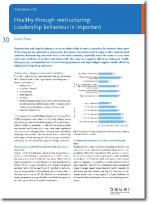The world of work is changing all the time. Companies have to constantly adapt and reorient themselves in order to stay competitive. Managers play an important role here in communicating new structures and processes. At the same time, however, they are also affected by such changes themselves.

The impacts of the adjustments that organisations constantly have to make in order to keep pace with a changing environment have been researched in various projects conducted by the Federal Institute for Occupational Safety and Health (Bundesanstalt für Arbeitsschutz und Arbeitsmedizin, BAuA). Digitalisation and the transformation of the world of work that is taking place in parallel to it are amplifying each other and altering daily work routines profoundly. As well as holding out opportunities, these developments pose risks for companies and employees, and frequently provoke resistance among staff. It is proving particularly challenging for businesses to take the whole workforce along with them on the journey to the World of Work 4.0.
Role and significance of leadership
Leadership, in the sense of the direct management of employees, denotes the process by which workers' attitudes and behaviour are influenced in organisations, and by which their work is directed and coordinated both inside and across groups in order to achieve particular organisational aims. Managers are (partially) responsible for the operational achievement of each company’s strategic goals, and serve as central mediators between different organisational levels. Leadership activities are regarded as a key factor in satisfaction, performance, well-being, and health at work. Depending on the prevalent management style, such activities may be a central resource for employees to draw on or, alternatively, a stress factor that puts pressure on them - see also Mental Health in the Working World - Leadership (German only).
However, managers themselves are not being left unaffected by the increasingly diverse requirements that have to be satisfied. Worlds of work evolving constantly at an ever faster pace and organisational restructuring processes confront leaders with new challenges and burdens: they have to evaluate themselves and their understanding of leadership over and over again, adapting to altered demands. Not only that, the expectations employees have of their leaders are also changing, as shown by BAuA's recent internet analysis The Necessity of Leadership in a Digitalised World of Work - a Netnography (German only).
Although it has previously been possible to demonstrate significant correlations between leadership behaviour and the mental health of an organisation's employees, research rarely focusses on the health of managers themselves. Furthermore, it has been proven that there is a connection between leadership behaviour and employees’ health, but the underlying mechanisms are still unclear.
Importance of organisational parameters
Leadership activities depend to a great extent on the organisational parameters within which managers perform their duties. These parameters include structural characteristics such as the size of the company, specific features of the sector in which it operates, and personnel development processes. In addition to this, the organisational climate and cultural aspects such as the company’s error culture and approach to communication are of central significance. These parameters determine the options for action managers have available to them. They have consequences both for working conditions and, indirectly, for managers’ and employees' performance and health. Nor should the active roles played by workers and the opportunities they have to exert influence be disregarded. This is true with regard to individuals' health just as much as the successful achievement of organisational goals.
BAuA’s Leadership and Organisation in the Changing World focus programme
The various topics associated with organisational transformation and the implications they have for managers constitute the new, long-term research focus for BAuA. Managers' functions and how they interact with employees are to be researched, while work design recommendations will be drawn up for real-life situations that make it easier for managers to deal with change in companies and cope with their own roles. BAuA's leadership research is closely linked with other current and past projects on restructuring, mental health, and the digitalisation of the world of work.

